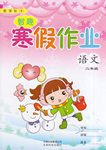The clock struck eleven at night. The whole house was quiet. Everyone was in bed except me. Under the strong light, I looked sadly before me at a huge pile of that troublesome stuff(东西) they call “books”.

I was going to have my examination the next day. “When can I go to bed?” I asked
myself. I didn’t answer, In fact I dared not.

The clock struck twelve. “Oh, dear! ” I cried. “Ten more books to read before I can go to bed!” We pupils are the most unhappy creatures in the world. Dad does not agree with me on this. He did not have to work so hard when he was a boy.

The clock struck one. I was quite desperate(绝望的) now. I forgot all I had learned. I was too tired to go on. I did the only thing I could. I prayed, “Oh, God, please help me pass the exam tomorrow. I do promise to work hard afterwards, Amen.” My eyes were so heavy that I could hardly open them. A few minutes later, with my head on the desk, I fell asleep.

64. When the author was going over his lessons, all the others in the house were ________ .

A. asleep B. outside C. working in bed D. quietly laughing at him

65. Reviewing his lessons didn’t help him because ____ .

A. it was too late at night B. he was very tired

C. his eyes lids were so heavy that he couldn’t keep them open

D. he hadn’t studied hard before the examination

66. What do you suppose happened to the author the second day?

A. He went to a church to pray again B. He got an A in the exam

C. He failed in the exam D. He was punished by his teacher

67. The best title for the passage would be _________ .

A. The Night Before the Examination B. Working Far into the Night

C. A Slow Student D. Going Over My Lessons

 智趣寒假作业云南科技出版社系列答案
智趣寒假作业云南科技出版社系列答案













